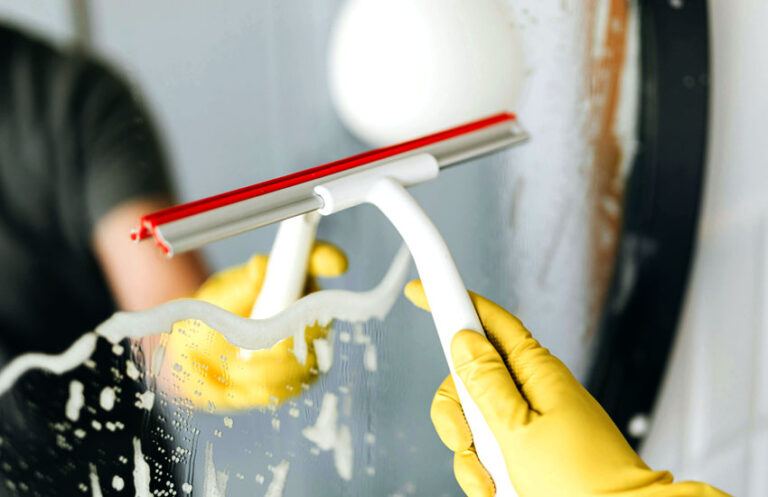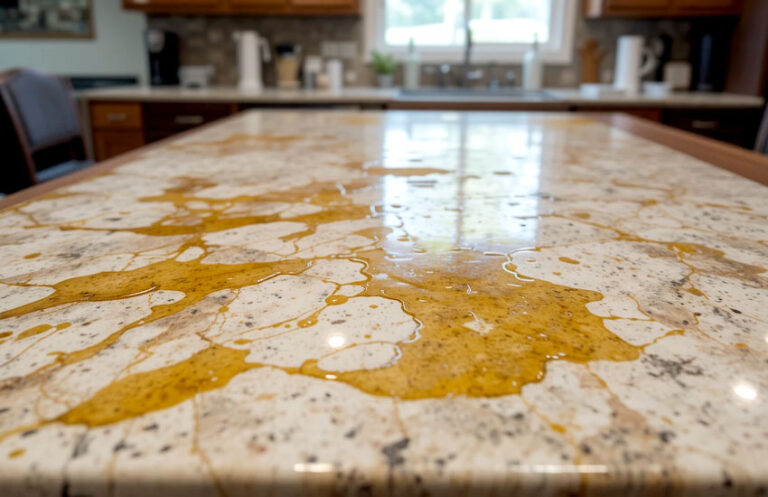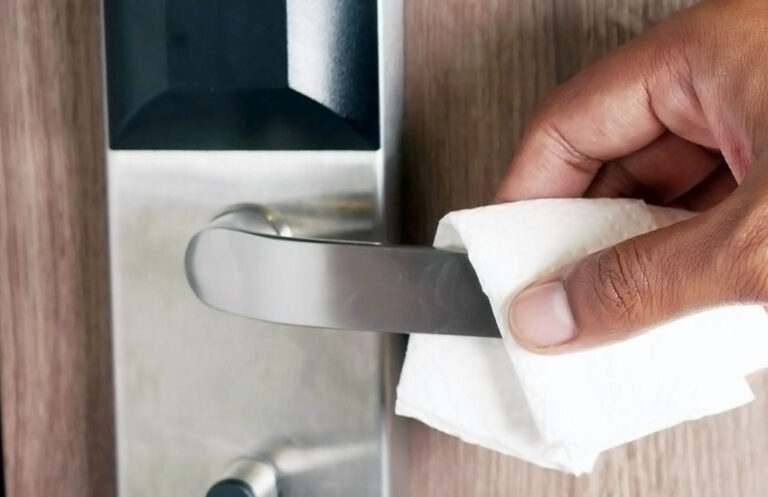As an Amazon Associate, I earn from qualifying purchases at no extra cost to you.
5 Simple Solutions to Remove Grease from Kitchen Surfaces
Cooking in the kitchen can often lead to a beautiful meal, but also a lot of mess. One of the most persistent and difficult-to-clean problems in a kitchen is grease. Whether it’s splattered on the countertops, walls, or stovetop, grease buildup can create an unpleasant and sticky environment.
Over time, this grease can also attract dust and dirt, making your kitchen appear dirty and neglected. The good news is that you don’t need expensive chemical cleaners or professional help to tackle this problem. With a few simple ingredients and techniques, you can effectively remove grease from kitchen surfaces and bring back that fresh, clean look.
In this article, we’ll explore five easy and natural solutions to remove grease from your kitchen surfaces. These solutions are not only budget-friendly but also environmentally friendly, as they avoid the harsh chemicals often found in store-bought cleaners. So, if you’ve been battling with grease stains on your kitchen surfaces, keep reading to learn how to easily tackle this common problem!

1. Vinegar and Baking Soda: The Dynamic Duo for Kitchen Grease Removal
When it comes to tackling grease, vinegar and baking soda are two of the most effective and affordable ingredients you can use. These two household staples work together to create a powerful cleaning solution that can cut through grease and leave your kitchen sparkling clean.
Why Vinegar and Baking Soda Work So Well
Vinegar is a natural acid, which makes it great at breaking down grease, especially when combined with the alkaline properties of baking soda. This combination works in several ways: first, the vinegar helps to break down the grease itself, while the baking soda gently scrubs away any buildup. Additionally, vinegar helps to neutralize odors, leaving your kitchen smelling fresh.
How to Use Vinegar and Baking Soda to Remove Grease
The first step is to mix the two ingredients. In a small bowl or container, combine equal parts of white vinegar and baking soda. You’ll notice that the mixture will bubble up, which is a sign that it’s working to break down grease. Once the bubbling has settled, you can apply the mixture to the greasy surface.
For kitchen surfaces like countertops, backsplashes, and stove tops, start by sprinkling the baking soda directly on the grease. Then, pour or spray vinegar over the baking soda. Allow the mixture to sit for a few minutes to let the vinegar and baking soda work their magic. After waiting, use a sponge or soft cloth to scrub the area gently in circular motions. Pay attention to any stubborn spots, and don’t be afraid to add a little more of the mixture if needed.
Once the surface is clean, wipe it down with a damp cloth to remove any leftover vinegar and baking soda residue. You’ll be left with a clean, grease-free surface without the harsh chemicals found in many commercial cleaners.
Tips for Success
- For particularly stubborn grease, you can allow the mixture to sit for a longer period of time (up to 15 minutes).
- If your kitchen surface is delicate, like marble or granite, be cautious when using vinegar, as it can potentially damage these surfaces over time. In such cases, you can try using just the baking soda with water or choose a different cleaning solution from our list.
- Always dry the surface thoroughly after cleaning to prevent any lingering moisture.
Using vinegar and baking soda together is an excellent option for greasy kitchen surfaces because of how simple, inexpensive, and effective the solution is. Plus, it’s an eco-friendly alternative to chemical-based cleaners.
2. Lemon and Dish Soap: A Refreshing Approach to Grease Removal
Lemon is another natural ingredient that can help tackle grease. Its acidity and natural oils make it an excellent degreaser, and when combined with dish soap, it becomes a powerhouse for cleaning kitchen surfaces. The best part is that it leaves behind a fresh, citrusy scent that will make your kitchen smell clean and inviting.
Why Lemon and Dish Soap Are Effective
Lemon contains citric acid, which is great for breaking down grease and grime. Its acidity helps to dissolve oil, while its natural oils can cut through the grease itself. When combined with dish soap, which is formulated specifically to break down oils and fats, this duo becomes an even stronger cleaning solution.
Dish soap is effective at emulsifying oils, meaning it helps to break up grease into smaller particles, which can then be wiped away. Lemon juice helps to enhance this process, providing both a powerful cleaner and a pleasant smell.
How to Use Lemon and Dish Soap for Grease Removal
To start, squeeze the juice of one lemon into a small bowl or container. Add a few drops of dish soap to the lemon juice. You can also add a small amount of warm water to dilute the solution if needed. Mix the ingredients together until you have a soapy, citrus-scented cleaning solution.
Using a sponge or cloth, apply the mixture to the greasy surface. Whether it’s your stove, range hood, or backsplash, gently scrub the greasy spots with the solution, using circular motions. If needed, apply more of the mixture to particularly greasy areas.
After scrubbing, wipe down the surface with a damp cloth to remove any soap and lemon residue. Finally, dry the surface with a clean towel to leave it looking fresh and sparkling.
Tips for Success
- For extra cleaning power, you can also rub the lemon directly onto the greasy surface before adding the dish soap. This will help the lemon juice break down the grease even faster.
- Make sure the surface is cool to the touch before applying the mixture, especially if you’re working with an oven or stovetop.
- If you’re cleaning your kitchen range hood, avoid getting the mixture into any electrical components. Use a damp cloth and take care to avoid any crevices where liquid could enter.
Using lemon and dish soap is a great option for cleaning grease from kitchen surfaces, especially because it’s such a refreshing and pleasant solution. It’s perfect for everyday grease removal and leaves your kitchen smelling wonderful.
3. Baking Soda Paste: The Power of Scrubbing Away Grease
Baking soda alone is a powerful grease remover that’s perfect for tough, stuck-on grease stains. Its slightly abrasive texture allows it to scrub away grime, while its alkaline properties help break down the grease. By creating a baking soda paste, you can target even the most stubborn grease stains.
Why Baking Soda Paste Works So Well
Baking soda’s natural abrasiveness makes it ideal for scrubbing surfaces without causing damage. It works by physically lifting grease from the surface, and the paste helps to keep the baking soda in place longer, giving it more time to break down the grease. This makes it perfect for areas where grease has accumulated over time, like stovetops or range hoods.
The paste can also be used to clean different types of kitchen surfaces, such as countertops, tiles, and even kitchen appliances. It’s safe for most surfaces, including stainless steel and ceramic, though you should always check a small area first before applying it to a large surface.
How to Make and Use a Baking Soda Paste for Grease Removal
To create a baking soda paste, mix a few tablespoons of baking soda with just enough water to form a thick, spreadable paste. You want the paste to be thick enough to stay on the greasy surface without running off. Once your paste is ready, apply it to the greasy area using a sponge or your fingers.
Let the paste sit for about 10-15 minutes to allow the baking soda to break down the grease. After that, use a damp cloth to scrub the area in circular motions, working the paste into the grease. For particularly stubborn spots, you may need to apply a little more paste and let it sit for a few more minutes.
Once you’re happy with the results, wipe down the surface with a clean, damp cloth to remove any remaining paste. Finally, dry the surface with a towel to avoid any moisture spots.
Tips for Success
- Baking soda is perfect for scrubbing, so don’t be afraid to apply a little elbow grease for tougher stains.
- If you find that the paste is too thick to spread easily, simply add a tiny bit more water.
- This method works best for surfaces like stoves, range hoods, and kitchen tiles. However, avoid using it on delicate or polished surfaces like granite, as it could cause scratching.
A baking soda paste is a fantastic choice for heavy-duty grease cleaning. It’s cheap, effective, and gentle enough to use on a variety of surfaces in your kitchen.
4. All-Natural Essential Oils and Water: A Non-Toxic Option
If you’re looking for a more natural solution to grease removal, essential oils are a great alternative. Combining essential oils with water creates a powerful, natural cleaner that works wonders on grease. Plus, essential oils bring their own added benefits, such as antibacterial properties and pleasant scents that can leave your kitchen smelling amazing.
Why Essential Oils Are Effective for Grease Removal
Essential oils, like lemon, orange, and tea tree, have natural degreasing properties. They can cut through grease and grime just as well as traditional cleaners, but without the toxic chemicals. Essential oils also have the added benefit of helping to disinfect surfaces while leaving behind a fresh fragrance. They are perfect for anyone looking for a non-toxic way to clean their kitchen.
How to Use Essential Oils and Water to Remove Grease
To create your essential oil cleaning solution, mix 1-2 drops of essential oil with warm water in a spray bottle. You can use lemon, orange, or any citrus-based essential oils for their degreasing qualities, or tea tree oil for its antibacterial properties. Once your mixture is ready, shake the bottle to ensure the oils are well-distributed.
Spray the solution directly onto greasy kitchen surfaces such as countertops, cabinets, or stovetops. Let the mixture sit for about 5-10 minutes to allow the oils to break down the grease. After that, wipe down the surface with a clean, damp cloth, scrubbing any stubborn spots. Dry the surface with a towel for a clean and fresh-smelling finish.
Tips for Success
- Use distilled water in your solution for a cleaner result, as tap water may leave residue behind.
- Essential oils are potent, so only a few drops are needed to be effective. Overuse of essential oils can cause skin irritation, so be cautious with the amount.
- For extra cleaning power, you can add a teaspoon of white vinegar to your essential oil and water solution.
This all-natural cleaning solution is perfect for those who want to avoid harsh chemicals. It’s gentle, effective, and leaves your kitchen smelling fantastic.
5. Commercial Degreasers: A Quick and Efficient Option
While natural remedies are excellent, sometimes you need a more powerful solution, especially for heavy-duty grease buildup. In these cases, commercial degreasers can be very effective. These cleaners are formulated to break down grease quickly and efficiently. However, it’s important to choose a degreaser that’s safe for kitchen surfaces and avoid those with harsh chemicals.
Why Commercial Degreasers Work
Commercial degreasers contain specialized ingredients designed to break down grease quickly and efficiently. They often work faster than natural solutions and are excellent for dealing with large amounts of grease. Some degreasers are also formulated to be safe on kitchen surfaces, so they won’t damage your countertops, appliances, or cabinets.
How to Use Commercial Degreasers
When using a commercial degreaser, always read the instructions carefully. Most degreasers come in spray bottles, which makes them easy to apply directly to greasy surfaces. Spray the degreaser on the affected areas and let it sit for the recommended amount of time. After that, scrub the area with a sponge or cloth to remove the grease.
Once the grease has been removed, wipe the surface down with a clean, damp cloth to remove any leftover cleaner. Be sure to follow up with a dry towel to prevent any streaks or water spots.
Tips for Success
- Always test the degreaser on a small, inconspicuous area first to ensure it won’t damage your surfaces.
- Avoid using degreasers on sensitive surfaces like marble or granite.
- Follow the manufacturer’s instructions carefully to ensure you get the best results.
Commercial degreasers are a quick and efficient solution when natural methods aren’t enough. Just be sure to choose a cleaner that’s safe for your kitchen surfaces.
Are These Questions in Your Mind?
Is it okay to mix vinegar and baking soda for cleaning?
Yes, mixing vinegar and baking soda is safe and effective for cleaning most surfaces. The combination helps break down grease and grime.
Can I use lemon juice for cleaning greasy kitchen surfaces?
Absolutely! Lemon juice contains natural acidity that helps break down grease. It’s especially useful when combined with dish soap.
Do I need to use warm water when mixing essential oils and water for cleaning?
Yes, using warm water helps to dissolve the essential oils more effectively and ensures better distribution when spraying.
Is it safe to use a commercial degreaser on stainless steel?
Most commercial degreasers are safe for stainless steel, but you should always check the label to ensure compatibility with your appliances.
Can I clean grease from my kitchen cabinets with baking soda?
Yes, baking soda is great for cleaning grease from cabinets. Make sure to create a paste with water for effective results.
Do I need to rinse after using dish soap and lemon juice?
Yes, after using dish soap and lemon juice, it’s essential to rinse the surface to remove any soap residue.
Is it necessary to wear gloves while using commercial degreasers?
While it’s not always necessary, it’s a good idea to wear gloves when using commercial degreasers, especially if they contain harsh chemicals.
Can essential oils be used to clean other surfaces like bathroom tiles?
Yes, essential oils can be used to clean a variety of surfaces, including bathroom tiles, as they have antibacterial and degreasing properties.
Is baking soda safe to use on all kitchen surfaces?
Baking soda is generally safe on most kitchen surfaces, but avoid using it on delicate or polished surfaces, as it may scratch.
Can I use vinegar on my stovetop to remove grease?
Yes, vinegar is safe to use on most stovetops and is excellent for cutting through grease. Just be sure to wipe the surface thoroughly afterward.
I hope these simple solutions have given you the confidence to tackle the grease buildup in your kitchen. Whether you choose natural ingredients like vinegar, baking soda, and lemon, or opt for a commercial degreaser, the key is to find what works best for you. With these easy-to-use techniques, your kitchen surfaces can stay clean and grease-free!





